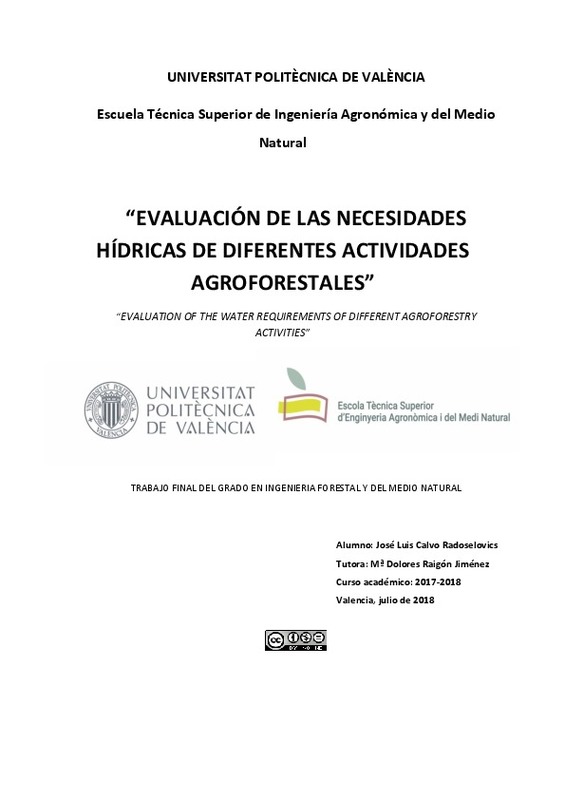|
Resumen:
|
[ES] La escasez de agua constituye uno de los principales desafíos del siglo XXI al que se están
enfrentando ya numerosas sociedades de todo el mundo. A lo largo del último siglo, el uso y
consumo de agua creció a un ...[+]
[ES] La escasez de agua constituye uno de los principales desafíos del siglo XXI al que se están
enfrentando ya numerosas sociedades de todo el mundo. A lo largo del último siglo, el uso y
consumo de agua creció a un ritmo dos veces superior al de la tasa de crecimiento de la
población y, aunque no se puede hablar de escasez hídrica a nivel global, va en aumento el
número de regiones con niveles crónicos de carencia de agua. La escasez de agua es un
fenómeno no solo natural sino también causado por la acción del ser humano. Hay suficiente
agua potable en el planeta para abastecer a los 7000 millones de personas que lo habitan,
pero ésta está distribuida de forma irregular, se desperdicia, está contaminada y se gestiona
de forma insostenible. La influencia de la gestión forestal sobre el ciclo hidrológico es poco
conocida, teniendo en cuenta la cantidad de factores que influyen directa e indirectamente en
el ciclo hidrológico. Por ello, el principal objetivo de este trabajo es aportar datos sobre la
disponibilidad del agua en un área forestal de clima mediterráneo de la Comunitat Valenciana,
en concreto, en la comarca de El Camp del Túria y evaluar las repercusiones del ciclo
hidrológico sobre la sostenibilidad de las masas forestales, en concreto de las masas forestales
presentes en la comarca.
El estudio se lleva a cabo, realizando el balance hídrico, tomando como datos meteorológicos,
los de las estaciones climáticas de Llíria y Bétera. Los resultados del balance hídrico con los
datos de cada zona climática no difieren significativamente, por lo que pueden ser
representativos de la zona.
Cada territorio responde a un modelo de ciclo hídrico. Por lo que el concepto de agua forestal,
la gestión del ciclo hídrico forestal, así como la provisión de agua del bosque, en la comarca de
El Camp del Túria se convierte en el servicio más importante de la masa forestal de esta zona y
es esencial para garantizar la multifuncionalidad y los servicios ecosistémicos o ambientales
de ésta zona. Las recargas de agua en la comarca de El Camp del Túria son positivas, pero ante
las situaciones de cambio climático, se debería incrementar las zonas forestales, dada la
influencia positiva sobre el incremento de las precipitaciones y la recarga de agua en la zona.
Palabras clave: Usos del agua, agricultura, industria forestal, turismo, jardinería,
sostenibilidad.
[-]
[EN] Water scarcity is one of the major challenges of the 21st century to which many societies
around the world are facing now. Throughout the last century, the use and water consumption
grew at a rate two times higher ...[+]
[EN] Water scarcity is one of the major challenges of the 21st century to which many societies
around the world are facing now. Throughout the last century, the use and water consumption
grew at a rate two times higher than the rate of population growth, and although I cannot
speak of water scarcity globally, is increasing the number of regions with chronic levels of lack
of water.
Water scarcity is a not only natural but also caused phenomenon by the action of the human
being. There is enough drinking water on the planet to cater to the 7,000 million people who
live in it, but this is distributed unevenly, goes to waste, is contaminated and is managed in
unsustainable way.
Therefore, the main objective of this work is to provide data on the availability of water in a
Mediterranean climate area of the Comunitat Valenciana, in particular, in the region of El
Camp del Túria and assess the impact of the hydrological cycle on sustainability of the forest
masses, in particular of the forest masses present in the region.
The study is carried out, realizing the hydric balance, taking as meteorological data, those of
the climatic stations of Llíria and Bétera. The results of the water balance with the data of each
climatic zone do not differ significantly, so they can be representative of the area.
Each territory responds to a water cycle model. So the concept of forest water, the
management of the forest water cycle, as well as the provision of forest water, in the region of
El Camp del Túria becomes the most important service of the forest in this area and is essential
to guarantee the
multifunctionality and ecosystem or environmental services of this area. The water recharges
in the region of El Camp del Túria are positive, but in the face of situations of climate change,
forest areas should be increased, given the positive influence on the increase in rainfall and the
recharge of water in the area.
[-]
|







